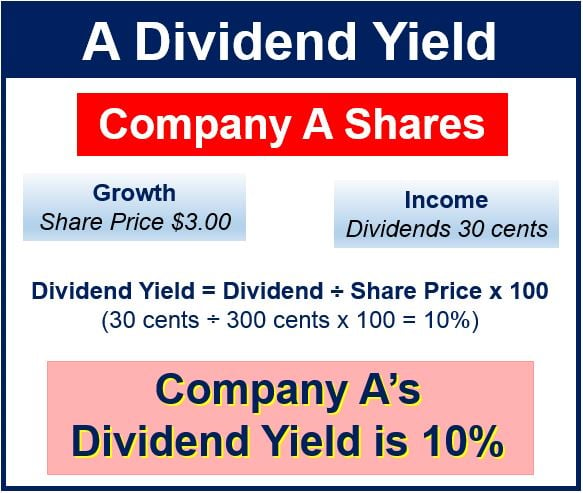Yield is the the amount in cash (in percentage terms) that is generated by an investment.
It is typically expressed on an annual basis as a percentage of the investment’s cost or current market value.
Yield is applied to a number of stated rates of return on: stocks, fixed income instruments, and other investment type insurance products.
Yield vs. return
If you ask most lay people what the difference between ‘return’ and ‘yield’ is, they will say they mean the same thing. This is not the case. Although both focus on how much money an investor has made or can make, how we calculate them are different.
Return looks at a certain length of time in the past, and includes all gains, including interest or dividends, capital gain (e.g. share price increase). It is backward-looking or retrospective.
Yield only looks at income, i.e. the dividend or interest earned, and ignores capital gain. Yield is forward-looking, or prospective.
Yield is one part of the **total return of holding a security. A high yield gives owners a chance to recover their investment sooner (reducing risk). However, a high yield could also result because of a falling market value for the security (resulting from higher risk).
** Total return is calculated by adding the dividend/interest payments of an investment to capital gain (the rise in its value).
Example:
Assume that there are two stock dividend yields. If the stock was bought for $15 (cost basis) and its current price is $30 and annual dividend is $2, then the “cost yield” equals 13.3% ($2/$15) and the “current yield” equals 6% ($2/$30).

Other meanings of yield
Agriculture – crop yield (or agricultural output) refers both to crop production per unit area of land cultivation, as well as the seed generation of the plant itself. It can also refer to the total production of a farm or agricultural area.
Driving – yield means to ‘give way’, to let other cars or pedestrians pass first.
Human interaction – it can mean the opposite of ‘to challenge’. For example, during the negotiations Group B eventually yielded, and Group A got what it wanted in the deal.
To succumb – meaning the opposite of ‘to resist’ or ‘to abstain’. The Irish author, playwright and poet Oscar Wilde (1854-1900) once said “The only way to get rid of temptation is to yield to it… I can resist everything but temptation.”
